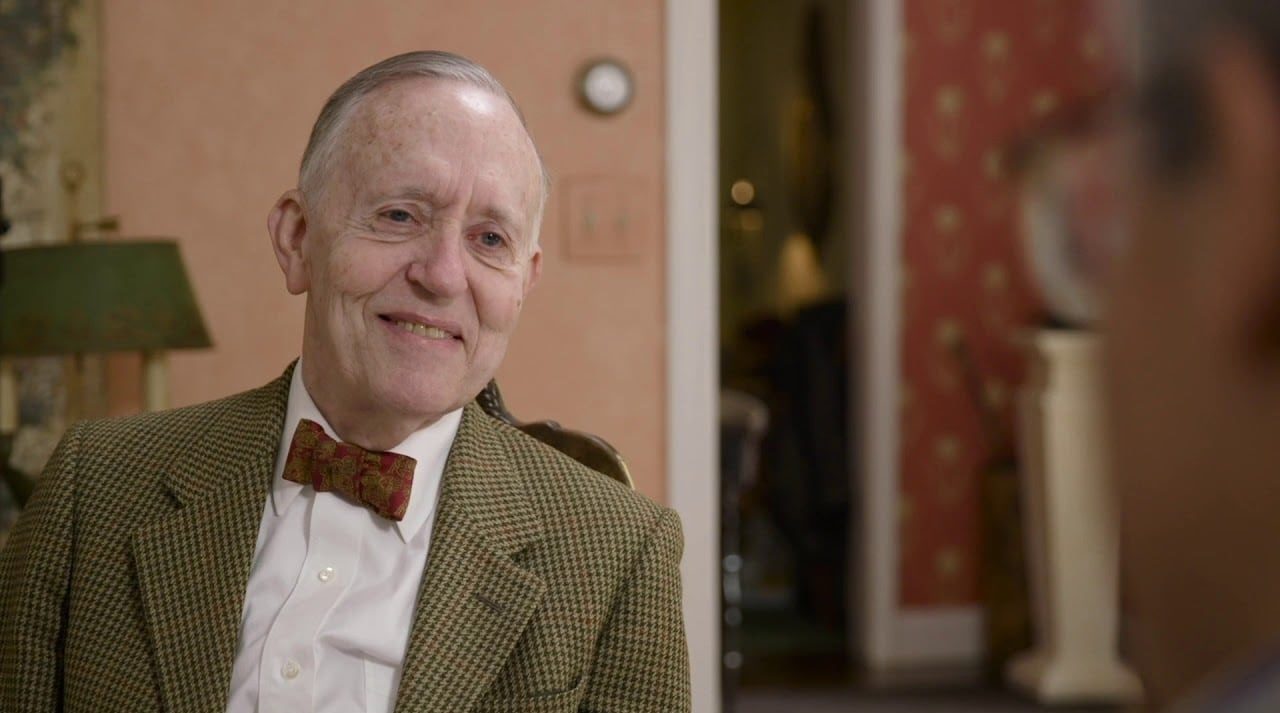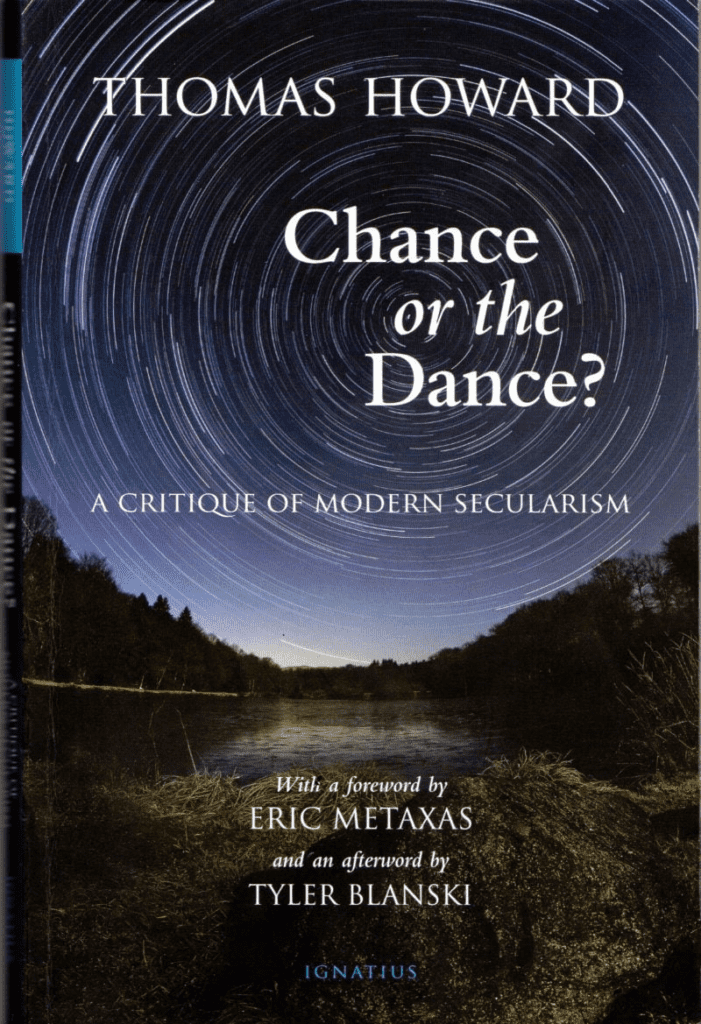
Thomas Howard in a still taken from a video interview conducted in October 2018 by Eric Metaxas.
PHOTO: IMAGE COURTESY OF ERIC METAXAS AND HIS PROGRAM, “SOCRATES AND THE CITY.”
Tom Howard is dead, and the tributes have been pouring in. I don’t want to repeat the story of his life that they tell — his achievements as a writer and academic, and his famous journey from Evangelicalism to Catholicism — but only to write a few words of gratitude for having known him. He was one of my favorite people in the whole world. And he had a lasting influence on my life.
When I was a teenager living in Gaming, in Lower Austria, where my father was teaching at the International Theological Institute (ITI), Tom Howard came several times as a guest professor. From the first time that I met him I was dazzled by his brilliance and wit. He and his wife Lovelace often came over to my parents’ house for dinner. I still remember one dinner in particular when he, Fr. John Saward, and Fr. Ian Ker were all visiting. The conversation flashed and sparkled like fireworks. I sat there with my mouth open, listening. Often, he gave the children of Gaming a recitation of “The Green-Eyed Dragon with the 13 Tails,” that was so dramatic that they would shriek with mingled delight and terror.
As time went on, I came to admire him even more for the childlike purity and innocence of his soul. It is very rare that one so brilliant is so pure. He had a great love of the Sacred Liturgy, and a deep sense of the majesty of God, and the infinite condescension of God’s incarnation. He had a connaturality with divine things that was entirely unfeigned. The dominant theme of his writings and teachings was that visible realities are signs of an invisible Reality in which they participate. Created things with their mysterious beauty are signs of the infinite beauty of God. The Sacraments of the Church were an intensification this meaningful character of visible reality. They signified sanctification and effected it at the same time. And they drew their efficacy from the most intense instance of meaningfulness: the Incarnation, in which the visible body of Christ is a sign of the invisible God whom He is.
Tom was an ardent monarchist; and like all of his thought, his monarchism was derived from his sacramental view of reality. In Chance or the Dance?, he sketched his argument for monarchy as follows:
[I]t was not for nothing that the king wore a crown of gold and that the lord mayor wore medallions. This was the political exhibition of what was, in fact, True — that there are royalty and authority and hierarchy at the heart of things and that it is possible to see this in lions and eagles and queen bees as well as in the court of the king. … We have an idea of royalty, this mind said, which we observe in our politics and which we attribute to lions and eagles, and we have this idea because there is a great King at the top of things, and he has set things thus so that our fancies will be drawn toward his royal Person, and we will recognize the hard realities of which the stuff of our world has been a poor shadow when we stumble into his royal court.

I found his political thought inspiring when I first learned from him as a teenager, and I still think is true today.
As I was being homeschooled when he first came to teach at the ITI, I was able to audit three of his classes — one on the Catholic novel, one on C.S. Lewis and J.R.R. Tolkien, and one on Dante. They left a lasting impression on my mind. I wrote a paper for the Catholic novel class, and Prof. Howard was so effusive in his praise that I was quite overwhelmed. It made me want to be a writer.
When he returned to America after that first guest semester in Austria, we began an e-mail correspondence that went on for many years. I was always astonished at his generosity, and the interest that he took in my juvenile thoughts. I sent him everything I wrote, and he would return it like a serve in tennis, with insightful comments.
When I went off to college, I didn’t see Tom in person for several years. But in the summer after my ordination to the priesthood I visited him in Massachusetts for a few days. They were some of the most joyful days of my life. Tom welcomed me with such joy and friendship. We sat together for hours on end reading favorite passages of books out loud to each other, and reciting poetry, and listening to music, and laughing. My heart expanded. To delight in so much beautiful prose and verse and music with him — much of which he had taught me to see the beauty of in the first place — was a foretaste in the shared delights, which we are promised after this valley of tears.
After that visit he sent me an e-mail. I hesitated to publish it, as it was meant for my eyes alone. But in thinking about Tom’s generosity towards me, the thought that kept coming to mind was how much like divine grace it was. I was quite unworthy of his notice, much less his interest, and yet he loved me, and shared his own love of truth and beauty with me. This e-mail manifests that very clearly:
Let me skirt the opening salutation: it would fall between two stools, the one being exiguity, and the other being effusiveness.
All day — virtually every minute, if the truth were known — you have been here in my heart, my dearest Thomas (if I may revert, just for a moment: you are indeed my ghostly Pater, but my love will never leave Thomas altogether behind). I find myself in a hitherto-unknown place. Joy and love seem to have become synonymous. You have brought me joy in these last few days, and that joy has been such — so intense, so bright, so full — that it would be impossible to distinguish it from love.
It may interest you to know that there is, quite literally, no other man whose mind, imagination, and soul delights in all — ALL — of the things my inner man exults in: the prose of Dr. Johnson, Evelyn Waugh, Christopher Hollis, Hilaire Belloc, CSL, and JRRT — and, one may say, the splendour-of-soul of each of those gentlemen; the poetry of Hopkins, CSL, and so many others whom we did not have time to canvass; our beloved Wolfgang Amadeus; Renaissance polyphony; the Tridentine Mass; the Latin of the psalms, the Benedictus, the Dies Irae, the Miserere, the Te Deum, and a hundred others; the Fathers — now, especially, William of St. Thierry; — and what else? The gold in the trove seems limitless.
My difficulty, at times, in managing to get through the reading aloud of various poems arose from the fact that what the poems themselves touch on always overwhelms me: but the thing that broke the dikes in this case was the fact that you were sitting here next to me. My tears came from a full heart.
Well, enough, mon cher: God shower ten thousand blessings on your noble head. My daily prayers are with you, my sweet Thomas and Pater.
May God grant that Thomas Howard’s soul pass from the shadows and images of this life to the unveiled vision of the Divine Glory.
This essay appears in the Winter 2020/2021 edition of The European Conservative, Number 18: 55-56.